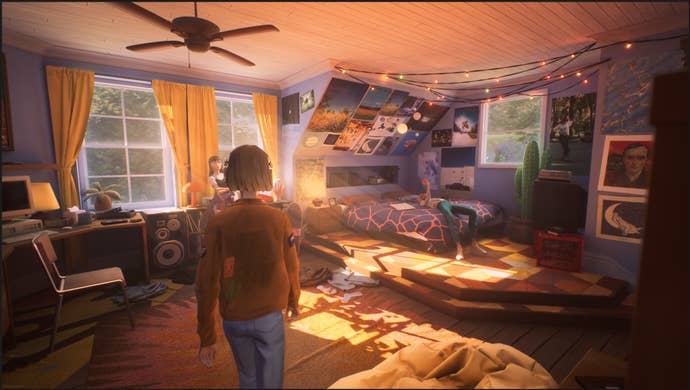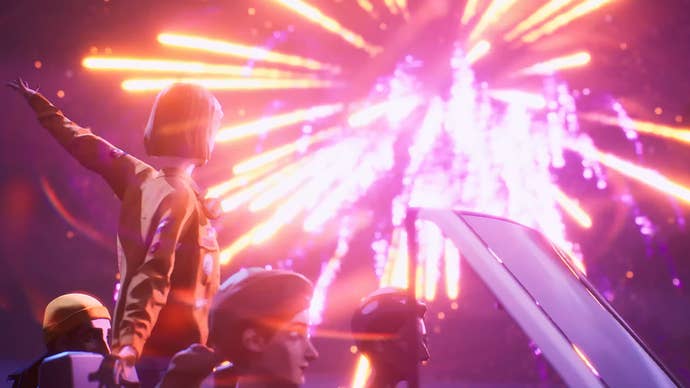Mixtape isn’t entirely the retro 90s nostalgia piece you might be expecting from trailers – it’s also a playable job application. Protagonist Stacy Rockford is enjoying one last night in their east US hometown with childhood friends Slater and Cassandra, before Rockford sets off to chase a music supervisor gig in New York City. Mixtape is both a going-away celebration and, on some level, Rockford’s portfolio project, edited together from teenage flashbacks and waiting to be thrust into the hands of a distant producer.
Watch on YouTube
This undertow of calculation cuts the smarm of a game I otherwise find quite sickly, for all its formal excellence. Going by 30 minutes with a build, Mixtape is another in an endless line of “triple-i” memorabilia exercises that dress old tech in autumnal colours, a work of craft and style but minimal bite, with no guiding emotion or agenda beyond a cloudy yearning for the good old days. Rockford’s careerism brings some useful cynicism to all this: put baldly, it’s a reminder that the past is a work of editing and that you can sell it to make your fortune.
In functional terms, Mixtape is a series of playable memories presented as MTV-style music videos, each housing some off-the-cuff and unfailable minigame vignettes, with songs from such choice 70s/80s bands as Roxy Music, Lush, and The Smashing Pumpkins – “the soundtrack of a generation”, according to the marketing materials. It starts with you skating down a hill to your house, the cast casually clapping along to Devo’s “That’s Good” while you perform jumps and flips. Later, you hammer a button to headbang in a car while the scenery shuffles.
The stop-motion animations call to mind Into The Spider-Verse, another production defined by its soundtrack, while Rockford’s habit of addressing you through the screen evokes the likes of High Fidelity. Yes, this is a game in which you tick the references, sometimes to the point that I would rather they just sent me the tracklist.

There’s some impression of mess and rawness, as when rolling a shopping trolley down a hill in a drunken escape from the fuzz. Mess is sort of the aim – as Matthew Castle wrote of the developer’s previous The Artful Escape, Mixtape is about “luxuriating in the sensory muchness of the thing”, basking in the glow of old CD players, posters and fairylights. There’s a sense throughout of being welcomed as one of the initiates even if (or perhaps especially if) you have no experience of the commodity or experience in question. After all, one player’s nostalgia may be another player’s tourism (developers Beethoven & Dinosaur are from Australia).
There is a chill within the glow, however. The pacing of scenes and references is finely chiselled – a reminder that the mixtape form isn’t all that “bootleg”, these days, but a commercial artform defined by tight virtuoso contrasts, and recently repopularised by Marvel films. The game’s “universal” 90s is precisely engineered, a composite of nods to different periods: Rockford’s friend Slater is a grungy skater boy, while Rockford’s dress sense is from the 1980s.
Rockford’s narration is poised between scruffy biro-label self-deprecation and military sharpness – you’d hate to get a reference wrong in front of them. Slater and Cassandra have their own quirks and foibles but generally seem to be dancing to Rockford’s beat, performing themselves to the camera in spurts of insouciance. That stagey self-awareness is authentically teenage behaviour, I guess. Then again, perhaps that is just a cliché I’ve been persuaded to accept. I grew up in the 90s, and I don’t see much of my teenage self in this.
Mind you, I grew up in drizzly northern Blighty, so there is likely some basic cultural disconnect going on here. Maybe some lingering resentment, as well. Rockford and their mates remind me heavily of the Cool Kids I avoided at school – smirkingly upholstered children who drank and smoked and horrified me with jokes I didn’t get, who owned multiple guitars and cited obscure bands and were probably very nice, really.

I did follow a few bands, just not the kind that tend to show up in games published by Annapurna Interactive. The soundtrack of my generation was Ded Good Music, who specialised in 90-second background techno for B2B videos and local TV documentaries. If you’ve heard their stuff, it’s either because you watched a lot of Newsnight or you had some corporate training at NatWest.
It’s beyond the scope of a coming-of-age tale, but I would quite like Rockford to fail to land that job. Not out of malice towards the character, but for the effect it could have on the polished and rhapsodic structure of the game. I want something to happen that disperses all this fuzzy-dovey lusting after bygone products and pop signifiers. I want the project to lose its way, to stutter and shatter a bit and show me an emotion that feels imperfectly wrought, even unsellable. Still I’m not sure the contrast between Rockford’s professional ambitions and Mixtape’s mushy throwback ambience is deliberate, and as you’ve hopefully deduced by now, I’m not very inclined to find out.







